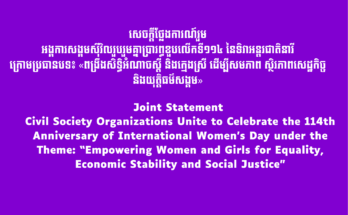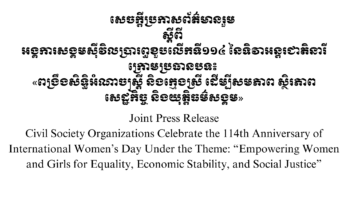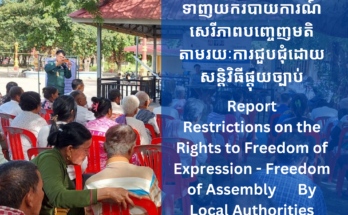SPEECH OF Mr. THUN SARAY
President of the Cambodian Human Rights and
Development Association (ADHOC) at the ASEAN Civil Society
Conference / ASEAN People’s Forum 2011
Hotel Ciputra, Jakarta, INDONESIA, May 3, 2011
Alternative Solution for a People Centered ASEAN
in the Global Community
First, I would like to convey my deepest respect to your Excellencies, ladies and gentlemen and all ACSC/APF Participants here in this hall. I would like also to express my thanks to the organizers of this important event for all their efforts to gather a civil society from ASEAN here in Jakarta. Today, I have a great honor and pleasure to be one of the speakers of this plenary. Since its establishment, ASEAN has been growing and has now reached a critical juncture in a fast changing regional and international environment. This new situation requires ASEAN to strengthen its unity and mechanisms for cooperation in particular following the adoption of the ASEAN charter in 2008 which transformed it from an Association of States into a formal legal entity. One of the important provisions in the Charter (Article 1.13) “promotes people-oriented ASEAN in which all sectors of society are encouraged to participate in, and benefit from, the process of ASEAN integration and community building”. ASEAN therefore is obliged to be attentive to and listen to the voices of the peoples of ASEAN and engage with them in a meaningful way.
The ACSC/APF forum, ever since its establishment in 2005 in Malaysia represents a venue for civil society to organize, build unity and provide a forum for peoples concerns and make recommendations to ASEAN leaders to be taken into account in their decision making processes at different levels. To make this process work successfully, ASEAN leaders and Governments should facilitate, participate and support these activities of the ACSC/APF. There should be no political control or creation of obstacles and difficulties with regard to these activities and the independence of ACSC/APF must be fully respected. Civil society organizations in each country of ASEAN should be recognized and supported and not continue to be restricted on pretexts such as anti-terrorist or political stability reasons. In my opinion, without independent civil society organizations, people’s voices cannot be heard by ASEAN leaders. I would like to appeal here to all ASEAN governments to respect and promote Freedom of Association in their own countries and not to use legislative, administrative and political measures to control this freedom. The full exercise of the freedom of Association requires Freedom of Expression and Freedom of Assembly as all three are inter-related. The effectiveness of ACSC/APF gatherings is therefore strongly dependent on the degree of independence of the civil society organizations in each ASEAN country.
Excellencies, ladies and gentlemen,
In order to make people’s engagement with ASEAN meaningful, there must be genuine dialogue between ASEAN’s peoples representatives and ASEAN Heads of State and this must become a reality in each ACSC/APF. Representatives of ASEAN’s peoples and civil society must be selected by the ACSC/APF itself and not decided on and imposed by ASEAN Ministers of Foreign Affairs. ASEAN’s leaders should have more courage to acknowledge the reality and real problems happening in their own country and region, and should be prepared to have a frank dialogue with representatives of civil society organizations and ASEAN people in order to find appropriate solutions. Interface meetings should be organized at the National level prior or post ASEAN Summit. National Interface Meeting could be more participative, practical and effective than at the regional level. The two levels of Interface Meeting could be complementary to each other.
Respect for Human Rights is a major factor in achieving sustainable peace and stability in each country and the region. This is why ASEAN’s Charter also contains provisions endorsing human rights promotion and protection and the creation of the ASEAN Inter-Governmental Commission on Human Rights (AICHR) on 23 October 2009 and the ASEAN Commission for the Promotion and Protection of the Rights of Women and Children (ACWC) on April 7, 2010. The establishment of these two bodies can be considered progress compared with the others sub-regions of Asian Continent, but these Human Rights mechanisms are very weak when compared to other continental mechanisms (such as African or Latino-American ones). ASEAN human rights bodies must be independent and impartial and have monitoring powers. This is the minimum to be expected and an important aim of civil society organizations. To reach this goal requires a lot of time and patient work from civil society, but it also requires the support of ASEAN’s leaders. They need to facilitate and ensure effective participation of civil society in ASEAN’s sector bodies and human rights mechanisms, both in the process of establishing these mechanisms and in their decision-making to ensure transparency and inclusiveness. Human Rights Principles must be considered as a core value of ASEAN peoples and must be mainstreamed into all processes of regional integration and community building.
Sensitization campaigns and updating information on ASEAN and its activities is very crucial in ensuring ASEAN member country populations engage with ASEAN. A low level of knowledge on ASEAN hampers people’s participation. More resources should be allocated to the outreach activities on ASEAN. Joint outreach activities between civil society organization and ASEAN member governments should be encouraged. ACSC/APF meetings and others ASEAN meetings, such as ASEAN youth exchange programs should be televised and broadcast through the public media in each country. Workshops, seminars on different topics about ASEAN at the local, national and regional levels with participation of all groups of people in each society should be organized more often.
Excellencies, ladies and gentlemen,
Article 2 of ASEAN Charter stipulates in points 2.c and 2.d, that “ASEAN and its member States shall act in accordance with following Principles: renunciation of aggression and of the threat or use of force or other actions in any manner inconsistent with international law and reliance on peaceful settlement of disputes”. But now some member States are using force and not peaceful means for settlement of disputes. If ASEAN wants to be a credible and strong community vis-à-vis to the rest of the world it must establish a functioning dispute settlement mechanism as stipulated in its Charter to solve conflict among member States. The present mediation role being played by Indonesia in the conflict between Cambodia and Thailand is an important test of the ASEAN capacity to solve conflict among their member States.
Thank you for your attention



